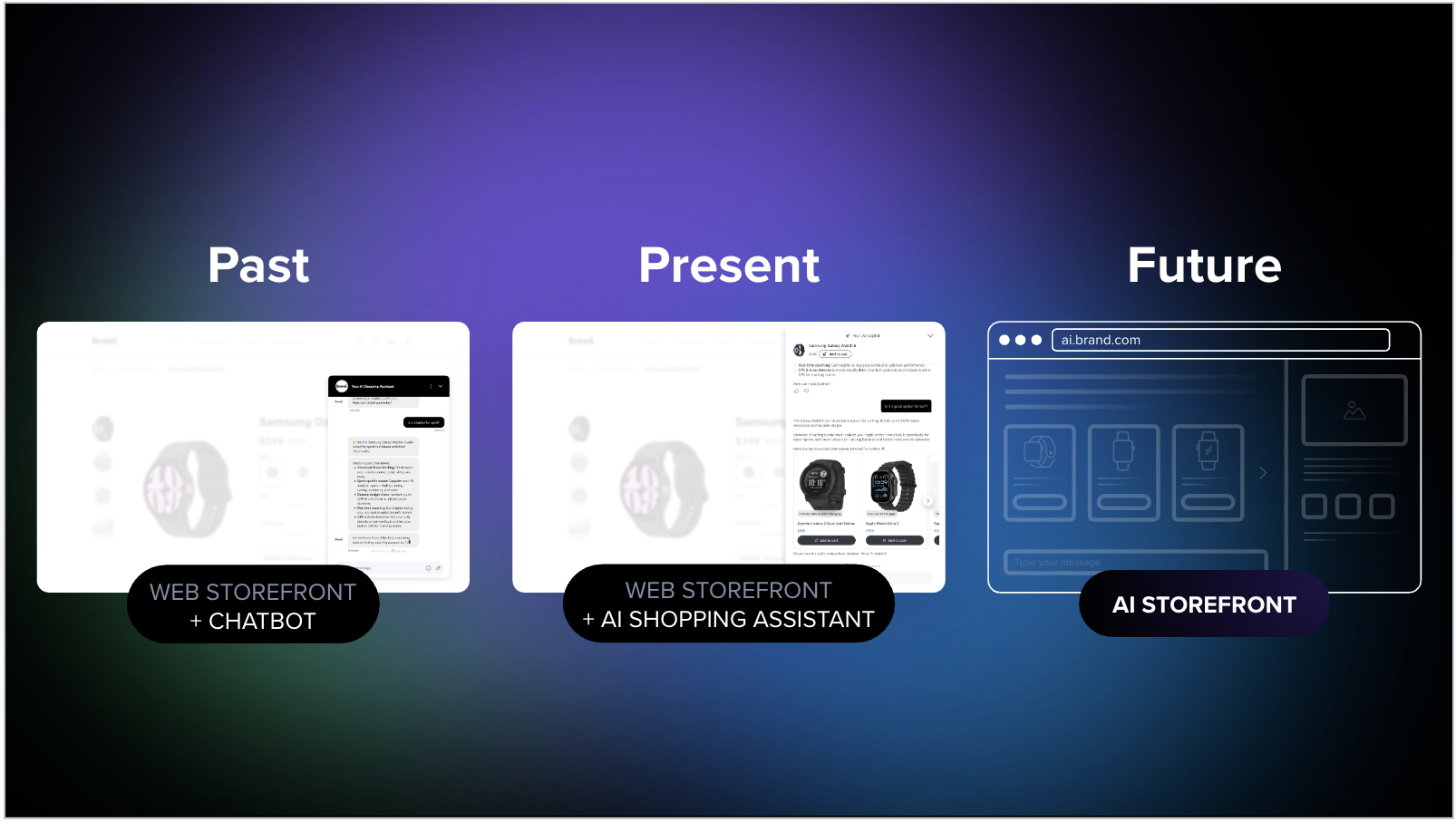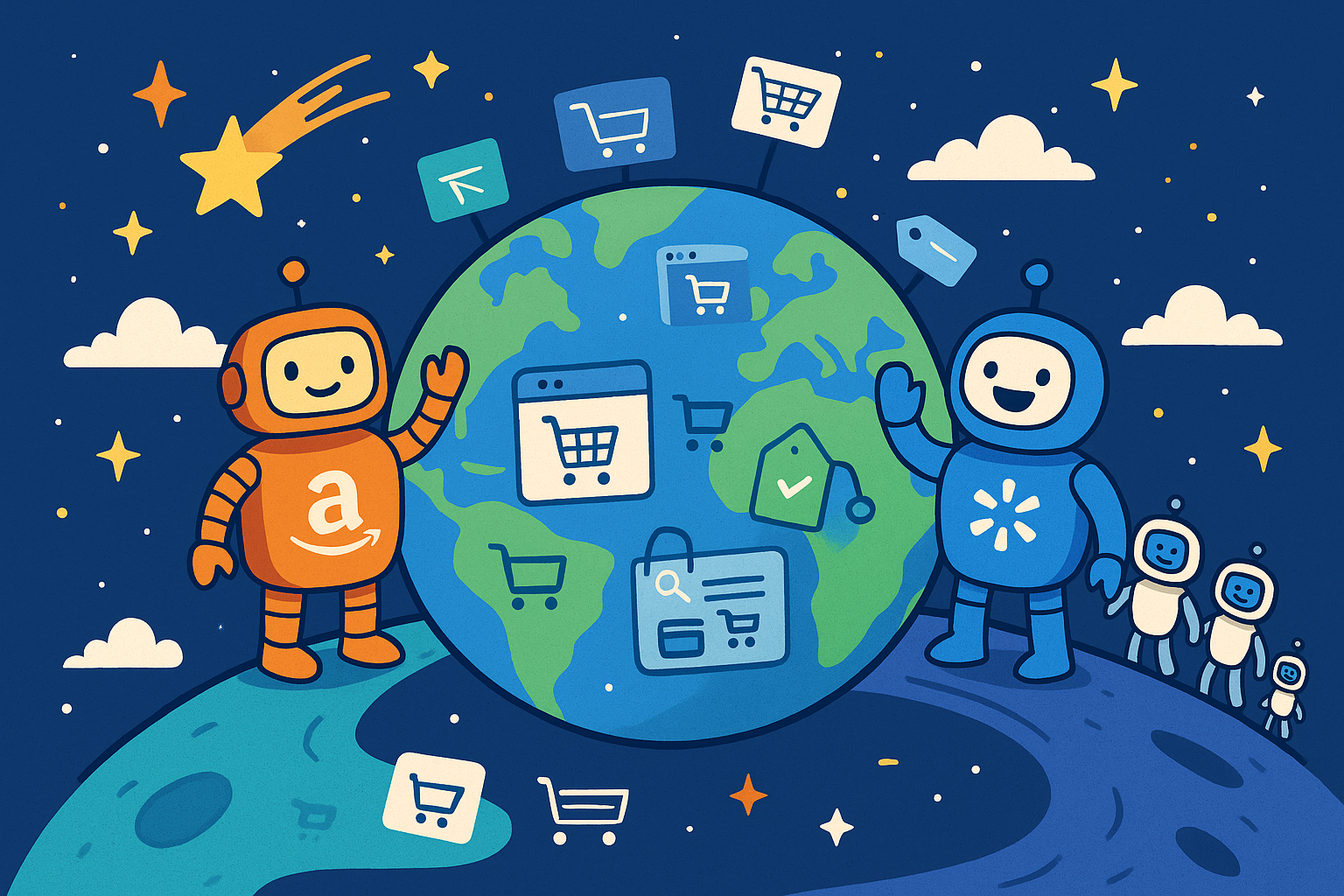How Conversational AI is Transforming the Retail Industry
iAdvize

If a picture is worth 1,000 words, then a mutually beneficial conversation is priceless. This is the purpose of leveraging conversational AI in retail. Offering the latest technological innovations alongside a level of personalization that would have been impossible a few years ago, this approach is already taking the e-commerce community by storm. Why is this strategy such a game-changer, and what advantages can it offer your retail business?
The value of the conversational AI marketplace in the United States alone is currently estimated to be just over $2.09 billion dollars. And these statistics are from 2023, so there's a good chance that the value of this technology is much higher. Conversational AI in retail settings in becoming more prevalent, and this trend shows no signs of slowing down. What changes have we already witnessed? What benefits can these AI-powered chatbots offer businesses of all sizes? What challenges might we need to overcome?
The Rise of Conversational AI in Retail
What is Conversational AI in Retail?
Conversational AI is a system intended to streamline relationships and communications with shoppers through the use of intelligent chatbots. From targeted customer feedback and personalized product recommendations to addressing questions on a 24/7 basis, these virtual assistants can help to streamline the entire customer experience.
Current research indicates that 55% of consumers regularly use some type of AI-based chat service to perform basic online tasks such as getting relevant product recommendations. The practical nature of AI-enhanced chatbots has gained a massive amount of attention, and the beneficial results are easy to quantify.
Key Trends Driving AI Adoption in Retail
The most practical reason to use these intelligent bots is to streamline the online shopping journey. Customers expect interactions to be more insightful, personalized, informative, and satisfying than ever before. Generic responses will not suffice. The current solution comes in the form of bots powered by conversational AI technology. IBM labelled this approach "elevating retail experiences". To put these observations into perspective, here are some statistics worth mentioning:
- The global marketplace for conversational AI is expected to reach $206 billion dollars by 2030
- More than 800 million consumers rely on some type of AI-assisted e-commerce technology
- The younger generation is more likely to employ conversational AI to enhance their online shopping experiences
Quicker, smarter, and more customized. These three simple concepts can now be used to generally summarize conversational AI in retail.
Enhancing Customer Experiences With Conversational AI
It's relatively easy to describe the purpose of these bots. However, applying the fundamental concepts outlined above requires closer examination. Let's learn more about why both customers and businesses are intrigued by the potential of this technology.
Conversational AI in Retail Customer Experiences: Personalization at Scale
What is personalization at scale? Simply put, its the ability of a retail business to analyze large data sets of individual users to provide more relevant consumer experiences based on previous habits and unique information. For example, modern conversational AI chatbot interactions can address extremely specific behaviors, preferences, and desires. This will result in a more satisfying end-user experience, and reflect positively on the brand.
Conversational AI relies on highly advanced algorithms that use technologies such as natural language processing (NLP) to better interact with a shopper. Conversational AI solutions also mimic everyday speech patterns so they can provide a much more organic experience.
It's still important to briefly mention a distinction between traditional chatbots and their newer, AI-powered counterparts. Older bots were limited by the number of responses they could give, often resulting in less-than-optimal interactions if a shopper had a specific question that didn't fall within the existing algorithm.
Conversational AI solutions constantly refine their responses, and ultimately offer a greater degree of flexibility. Think of the difference between a chatbot created in the late 1990s, and the fictional HAL-9000 computer from 2001: A Space Odyssey, to appreciate the evolution of conversational AI in e-commerce. Although this might be a slightly extreme example, it can still illustrate how far the technology has progressed.
Case Studies: Real-World Applications of Conversational AI in Retail
Let's examine the brand Sideshow; the leading specialty manufacturer and distributor of the most highly sought-after licensed and original collectible products. As this is a somewhat narrow target demographic, their team was looking for a way to better connect with shoppers through the use of smart conversational chatbots. They were thrilled with the results they saw after implementing the latest AI-powered messaging innovations:
- A 94% CSAT
- A 5x increase in conversion rate
- 88% of customers positively rated their interactive experiences
With the help of targeted conversational AI solutions, Sideshow was able to increase their conversion rates, to keep loyal shoppers satisfied, and to offer solutions comparable to human agents.
Increasing Retail Sales With Conversational AI
How Conversational AI Can Increase Retail Sales
There are several reasons why businesses that choose to employ this technology will enjoy higher conversion rates. Rapid and accurate responses increase customer loyalty, they reflect favorably on the brand, and they serve as a low-cost, efficient means to address queries within a matter of seconds. As clients have become more demanding than ever before, it stands to reason that businesses choosing to leverage these tools will enjoy a competitive edge, and a higher return on investment (ROI).
Techniques for Upselling and Cross-Selling With AI
The insights provided by this technology reach far beyond shopper satisfaction alone. AI chatbots can be used to recommend product upgrades that offer additional benefits (upselling), and to highlight related items that might also interest the customer (cross-selling). Both methods can further increase revenue generation and provide a more personalized shopping experience.
Impact on Customer Retention and Repeat Purchases
Considering the possibilities mentioned above, it's no surprise that such customer interactions help to increase brand loyalty and encourage future transactions. In fact, recent studies have shown a relationship between comprehensive automated communications and customer satisfaction.
Benefits of Conversational AI for Retailers
It's clear why shoppers are extremely interested in smart customer interactions. Still, let's remember that businesses can also benefit from the presence of this technology.
Efficiency and Cost Reduction
Conversational AI can help to automate many processes that previously had to be performed manually. For instance, fashion brand IKKS was searching for a way to enhance their customer support solutions, and to automate redundant tasks without sacrificing client satisfaction. After they implemented the latest conversational chatbot software, IKKS was able to offer shoppers cutting-edge levels of 24/7 support, to quickly resolve frequently asked questions, and to manage in-house costs more effectively.
Streamlining Customer Support and Service
One of the latest advancements involves the ability of AI-based conversational technology to be available at a moment's notice without sacrificing the depth of the interaction. Once again referring to "assistance at scale", these bots will offer superior levels of end-user support alongside continuous quality assurance. In other words, shoppers can easily access targeted solutions whenever they need it.
Challenges and Considerations
Potential Pitfalls of Implementing Conversational AI
One possible drawback to avoid involves companies choosing to use publicly available conversational AI bots. The issue is that it can be difficult to encounter specialized solutions with generic platforms. For instance, conversational commerce in fashion should be tailor-made to address fashion-related queries and support. Businesses otherwise risk implementing a package that lacks the personalization that shoppers expect.
Addressing Privacy and Data Security Concerns
Compliance is another topic that businesses need to take seriously. A contemporary example can be seen in the EU AI Act. In addition to GDPR regulations, companies deploying any type of chatbot assisted by artificial intelligence must ensure that they are adhering to the latest guidelines in terms of how information is obtained, shared, and used to enhance the end-user experience. These regulations will likely become even more stringent in the coming years, so it makes sense to work with a trusted conversational AI platform provider.
Stay Ahead: Why Retailers Must Embrace Conversational AI Now
Gain a Competitive Advantage
What separates the wheat from the chaff when discussing the online e-commerce experience? Many users cite the ability for businesses to address the discrete needs of their audience. Although this is nothing new, consumers are (understandably) more demanding than ever before. The use of conversational AI can offer the following advantages:
- Efficient customer engagement
- In-house efficiency by automating redundant tasks
- Providing a more personalized shopping journey
Although these are all tangible short-term benefits, we need to remember that long-term brand loyalty and a positive reputation in the e-commerce community are equally important.
Don't Fall Behind: The Urgency of AI Adoption
Although this isn't intended to be a reactionary observation, the state of play throughout the e-commerce community clearly indicates that conversational AI platforms are the way of they future. It's much better to ride the wave as opposed to allowing this momentum to pass you by. As customer expectations continue to evolve, remaining ahead of the curve is the best way to be prepared for whatever the digital future has in store.

.png)
.png)






